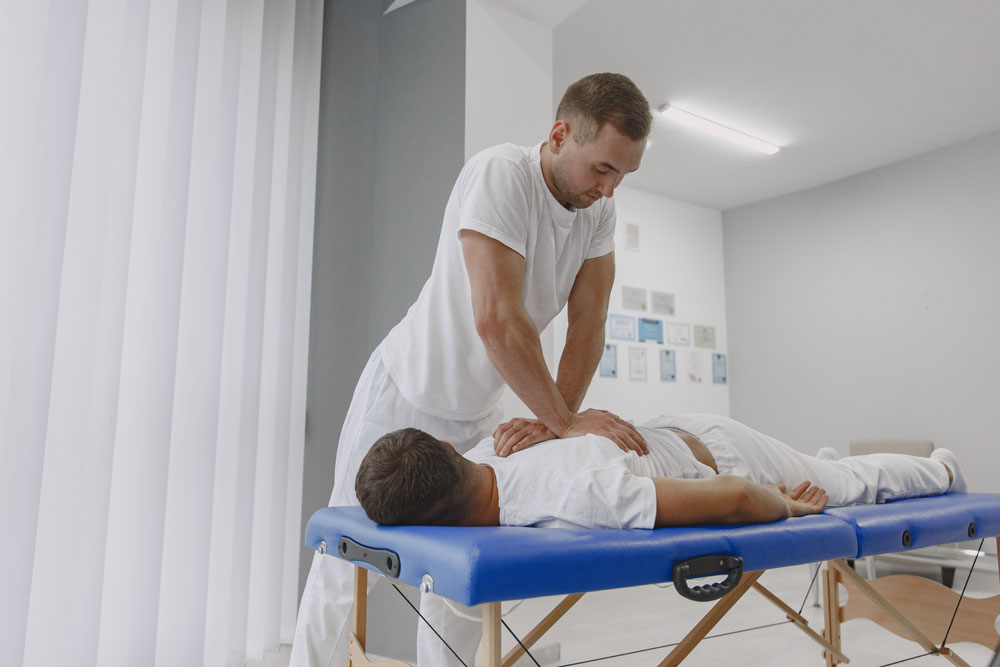
Summary: If back cracking feels painful or uncomfortable, listen to your body. Occasional pops are normal, but frequent discomfort could indicate a bigger issue. Please be on the lookout for chronic pain, limited mobility, or nerve symptoms, and seek medical advice if necessary.
The Truth About Back Cracking: Is It Good or Bad for You?
Have you ever felt the satisfying pop of your back cracking after a long day at your desk? While many people enjoy this sensation, it raises a crucial question: Is cracking your back good for you, or could it lead to health problems? In this article, we’ll explore the science behind back cracking, its potential risks, and safer alternatives to keep your spine healthy.
What Causes Your Back to Crack?
When you stretch or twist your back and hear that familiar crack or pop, it’s not just an amusing noise. This sound occurs due to the release of gases that build up in the fluid surrounding your joints over time. Think of it as tiny gas bubbles bursting when you adjust your posture. This process is known as cavitation, and while it often provides immediate relief, understanding the underlying mechanics can help you make informed decisions about your back health.
The Mechanics Behind Cavitation
Cavitation occurs when the synovial fluid in your joints, which serves to lubricate and nourish, experiences a sudden change in pressure. When you stretch your spine, the pressure within the joint changes rapidly, allowing these gas bubbles to form and collapse, resulting in the characteristic crack sound. While this phenomenon is often harmless, it is essential to recognize that the sound alone does not equate to any therapeutic benefit.
SPECIAL OFFER 50% OFF
Initial consult £80
X Ray’s if required £120
Special Offer 50% Off On Above Prices
The Role of Your Spine’s Proprioceptive System
Your spine is more than just a structure supporting your body; it plays a vital role in maintaining balance and posture. Proprioceptive muscles around the facet joints, or zygapophyseal joints, help your body understand its position in space. These tiny muscles include the interspinalis, intertransversarii, and rotators, which work together to facilitate smooth movements between vertebrae. When these muscles are in perfect harmony, your spine functions optimally. However, if one side of your spine is tighter or misaligned, it can lead to imbalances that may encourage frequent cracking.
The Importance of Proprioception
Proprioception is your body’s ability to sense its position and movement in space. It relies heavily on sensory feedback from muscles, joints, and skin. The proprioceptive input from your spine and its associated muscles is critical for maintaining balance and coordination. In fact, this system is so finely tuned that even slight changes can affect your overall stability. This is why understanding the intricacies of your back and its function is essential for long-term health.

The Risks of Frequent Back Cracking
While the occasional back crack may feel good, repeatedly trying to crack your back can pose several risks, including:
- Joint Instability: Over time, forcefully cracking your back can stretch ligaments, leading to instability and increasing the risk of osteoarthritis.
- Pinched Nerves: Forceful movements can irritate or pinch nerves, causing pain and discomfort. This can lead to symptoms such as tingling, numbness, or weakness in the extremities.
- Muscle Strain: Improper techniques can lead to muscle strains, exacerbating your back issues. Straining the muscles can result in further pain, making everyday activities challenging.
- Inflammation: Chronic cracking can cause inflammation around joints, leading to further complications. Inflammation can manifest as swelling, tenderness, and reduced mobility in the affected area.
If you find yourself needing to crack your back frequently, it might indicate an underlying issue that requires attention.
Why You Should See a Professional?
While self-cracking might provide temporary relief, it’s essential to consult with a healthcare professional like Finchley Back Care Centre or an osteopath. These experts can identify misalignments in your spine and use safe, controlled techniques to realign your joints, providing long-term relief without the risks associated with frequent self-cracking.
The Benefits of Professional Treatment
Government license & certification bodies in the UK for chiropractors General Chiropractic Council (GCC) and the British Chiropractic Association (BCA).
Professionals utilize a variety of techniques tailored to your specific needs. These may include:
- Spinal Manipulation: A controlled thrust to restore proper alignment and mobility to the spine.
- Soft Tissue Therapy: Techniques to relax tight muscles and relieve tension around the spine.
- Rehabilitation Exercises: Custom exercises designed to strengthen supporting muscles and improve flexibility.

Alternatives to Cracking Your Back
If you’re looking for relief without the risks of cracking, consider these safe and effective alternatives:
- Gentle Stretching: Incorporate stretches into your routine, such as seated lower back rotations and knee-to-chest stretches, to alleviate tension. Stretching not only promotes flexibility but also enhances blood circulation, contributing to overall spinal health.
- Heat Therapy: Applying a heating pad can help reduce stiffness and promote relaxation in your muscles. Heat therapy increases blood flow to the area, aiding in the recovery of strained muscles.
- Strengthening Exercises: Strengthening your core and back muscles can improve your posture and spinal health, reducing the urge to crack. Consider exercises like planks and bridges that engage multiple muscle groups.
- Regular Professional Care: Schedule regular visits to a qualified practitioner to keep your spine in optimal condition. Routine check-ups can help detect issues early, preventing long-term complications.
Listen to Your Body
Ultimately, if cracking your back feels uncomfortable or painful, it’s crucial to listen to your body. Occasional popping sounds aren’t usually a cause for concern, but frequent discomfort may indicate a larger issue. Seeking professional advice can help you understand the underlying cause and get the relief you need.
Recognizing the Signs
Be aware of your body’s signals. If you experience:
- Chronic Pain: Discomfort that persists for more than a few days.
- Limited Mobility: Difficulty in performing daily activities due to pain.
- Nerve Symptoms: Tingling, numbness, or weakness in your arms or legs.
It’s essential to seek medical advice promptly.
Conclusion: Crack Wisely
While cracking your back can feel satisfying, it’s essential to understand the potential risks associated with the habit. Prioritize your spine’s health by opting for safer alternatives and consulting a professional when needed. Remember, maintaining a healthy back contributes to your overall well-being, allowing you to enjoy life to the fullest!
FAQs
Is back cracking safe?
Occasional back cracking is generally safe if it’s natural or performed by a professional, but frequent self-cracking may cause joint strain.
Why does my back crack?
The cracking sound is caused by gas bubbles in the joint fluid popping due to pressure changes when the spine moves.
Can back cracking relieve pain?
Back cracking may provide temporary relief by releasing tension, but it’s not a cure for underlying issues. Persistent pain should be checked by a professional.
Should I let a chiropractor crack my back?
Yes, chiropractors are trained professionals who use controlled techniques to adjust the spine safely.
Why does my back crack so often?
Frequent cracking could result from joint hypermobility or stiffness. Consult a healthcare provider if it causes discomfort.
Is cracking your back bad for you?
Occasionally cracking your back isn’t harmful, but habitual cracking or forcing it can lead to joint or ligament damage over time.
Can back cracking fix alignment issues?
Back cracking alone won’t fix alignment problems, but chiropractors use spinal adjustments as part of broader treatment plans.
Why doesn’t my back crack when I try?
If your back doesn’t crack, it might not need adjustment. Forcing it can cause unnecessary strain on joints and muscles.
Do I need to see a professional if my back cracks a lot?
If frequent cracking is accompanied by pain, stiffness, or discomfort, consult a chiropractor or physiotherapist.
Is back cracking the same as chiropractic adjustments?
No, chiropractic adjustments involve precise, controlled movements by trained professionals, while back cracking is often accidental or self-induced.

